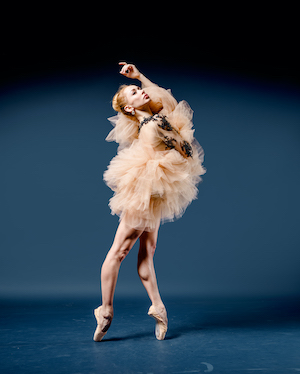Inspired by Chandradhar Sharma Guleri’s iconic Hindi short story Usne Kha Tha, choreographer Gary Clarke’s love story follows young Indian men from Punjab to the Belgian trenches of the First World War. The entire performance is set against a rolling stream of artistic and archival images of Indian soldiers projected onto a screen behind the dancers. Subtitles, similar to those of the silent m era, as producer Mira Kaushik OBE noted in the post-show Q&A, guide us through the narrative.
Beginning in rural Punjab, the cast jump, skip and run about the stage. Clad in kurtas and black turbans, they mime sewing, carrying pots on their heads, squatting and holding hands. Lehna’s (danced by Subhash Viman Gorania) and Leela’s (Vidya Patel) central love story begins as they stumble into one another in a busy market: a sort-of Bollywood “meet-cute”. After a few more intermittent bumps in the market over the next few years, their love story twists after Leela becomes betrothed to another. After receiving the call to arms, Lehna promises to protect Leela’s husband and son on the battlefield. Driven by his unfaltering love, he keeps his promise to Leela at the cost of his own life.

The cast is a gorgeous ensemble. Patel is excellent in her role of Leela. She brings her Kathak dance training to the role beautifully with easy fluidity, gorgeous gestural hands and an ever-so-expressive face. As the only woman on stage, she is a stark reminder of those left behind and the suffering that ensued at home. The men succeed in showing us the brotherhood that emerges between soldiers, especially for those so far from home. Subhash Viman Gorania and Mithun Gill move with both strength and playfulness, as they slap one other on the shoulder, dive into the floor and hold each other’s limp bodies. Alistair Goldsmith is bold in his performance as a German soldier. He slips between creepy and authoritarian with over-exaggerated leg extensions and a slinky spine.

However, despite its horrific context, The Troth lacks horror. With its percussive military score; intense drills of jumping jacks, push-ups and skipping; and fanfare of bagpipes and trumpets, it veers almost too close to rose-tinted. Apart from Patel’s moving portrayal of a mother’s despair and panic as her loved ones leave home, there is very little “grit”.
As Kaushik explained in the Q&A, The Troth does not directly discuss British colonialism. It is simply a love story set against a backdrop of war. Considering the generous support Akademi received from the British Army, it is not surprising that The Troth steers clear of statements about the political context that framed the enlistment of 1.3 million Indian soldiers. Nevertheless, The Troth succeeds in opening a conversation about the largest “voluntary” force assembled for the First World War. Under Gary Clarke’s choreographic vision, Akademi excellently pays tribute to the fate of 60,000 soldiers from undivided India who gave active service to the First World War.
Lest we forget.
Reviewed at The Place on 13 November


